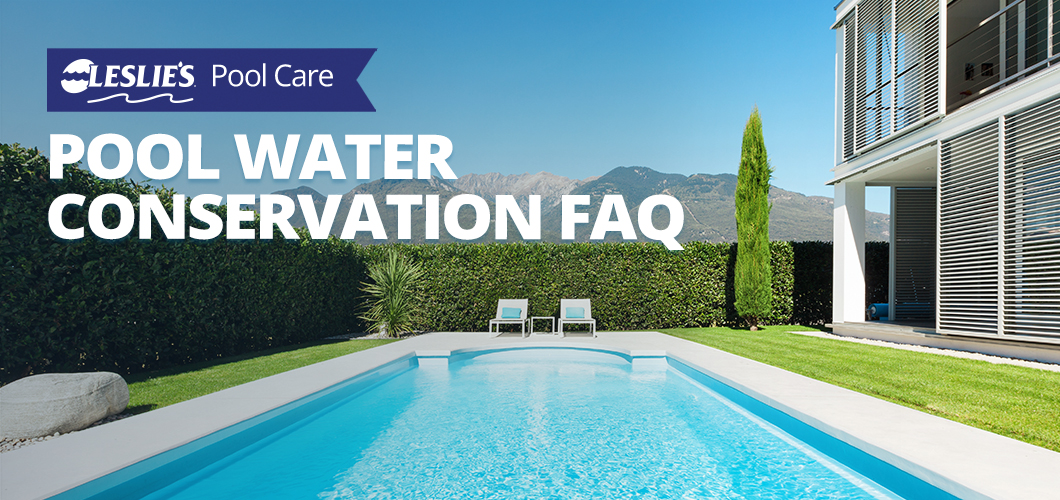
Pool Water Conservation FAQ
Conserving water and protecting the environment are more important today than ever before. Taking even the smallest steps to be more eco-friendly can make a huge impact. As wonderful and enjoyable as swimming pools are, it's important to recognize their impact on the environment. Understanding how to conserve pool water will help you become an even more responsible pool owner. And it will give you peace of mind knowing you're making a difference.
How much water does my pool lose to evaporation?

The average pool loses about ¼ inch of water a day due to evaporation. That can really add up over time. Adding a pool cover and keeping your pool clean and balanced can significantly reduce water loss. Cover Free, an invisible liquid barrier, can help reduce evaporation when your pool is uncovered and in use.
How will keeping my pool clean and balanced save water?
A clean pool needs less chemicals and backwashing. Keeping your pool covered when not in use reduces evaporation and keeps debris from blowing in your pool. Pools don’t often need draining if water chemistry levels are properly maintained. Test your water weekly or bring a sample in for a free AccuBlue® water test at any Leslie’s location.
Is it true that pools and spas use less water than lawns?
That’s correct! If you keep your pool properly maintained, it will use less water per day than an irrigated lawn.
How can I check my pool and equipment for leaks?
Inspect your equipment pad — look at the filter, pump, heater, and pipe valves for any visible leaks. Check the ground around your equipment pad and pool for wet soil and sunken or eroding areas. Your pool's water level should be about halfway up the pool skimmer. Mark your water level with tape or a grease pen, and keep an eye on it. Irregular water loss is a clear sign that you have a leak.
BONUS TIP: Suspect a leak? Most pool leaks can be found in a few common locations. And the good news is these common leaks are usually pretty easy to fix. Learn more in our blog post on How to Find and Fix a Pool Leak in 3 Easy Steps.
How can I minimize backwashing?

Most people backwash their pool filter more often than they need to, or backwash earlier than what the manufacturer recommends. Each time you backwash, you use 250–1,000 gallons of water, depending on your pool and equipment size. When backwashing your filter, keep an eye on the color and quality of the water, and stop the backwash process as soon as you can. Keep a cover on your pool when not in use to minimize debris buildup.
Remember, a cleaner pool means a cleaner filter and less backwashing. Switching to a cartridge filter can also eliminate the need to backwash completely.
What is the benefit of a cartridge filter?
The amount of water saved is the number one reason to use a cartridge filter. Instead of backwashing, cartridge filters only need to be removed and hosed off. Cartridge filters can actually trap smaller dirt particles than a traditional sand filter. They also work great with lower pump pressure, which can reduce your energy cost!
What else can I do to help?
To reduce evaporation, add water to your pool during the early morning or evening, rather than mid-day when the sun is out. If your automatic pool cleaner has a tile-spray option, be sure to turn it off to avoid additional water loss. A large amount of the spray evaporates before it even reaches the tile. Run your pool pump only when needed, or upgrade to a variable speed pump to save energy. Variable speed pumps also provide more efficient filtration and optimal flow for many tasks, which can help reduce water waste. Consider using your backwashed water to irrigate your yard or water any tolerant or hardy plants. Every small step adds up to big water savings.
Rebates are often available for upgrading to a more efficient variable speed pump or adding a solar cover to your pool. Check with your water and power provider to see what rebates are available in your service area.
More tips to conserve water:

- Use a solar cover. It can decrease evaporation by up to 95%, and make your pool more efficient. However, it can increase water temperature, which may increase chlorine consumption, accelerate evaporation while the pool is uncovered, and make the pool uncomfortably warm for swimming. Solar covers are best used during the cooler spring and fall months, unless local or state regulations require you to use them during the summer months.
- Minimize splashes in the pool by keeping the water level about halfway up the skimmer.
- Turn off any fountains, waterfalls, or aerators that increase the rate of evaporation.
- Regularly inspect and clean your pool filter. Consider replacing sand and DE filters with cartridge filters, which don’t require backwashing.
- Keep the pool water temperature down to reduce evaporation.
- Water chemistry balance is key. Properly maintain your pool or spa to avoid backwashing and extend the water life.
Looking for more ideas on preserving limited water resources? Check out our blog post, 5 Tips to Conserve Pool Water! Whether you're looking for help with water-saving methods like routine pool care, or whether you're looking to invest in eco-friendly equipment and accessories like solar covers, cartridge filters, or variable speed pumps, you'll find all the helpful advice you need at your local Leslie's.